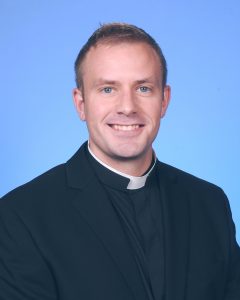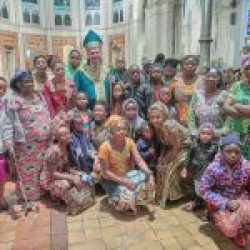By Brendan Foley
Editor’s note: Diocesan seminarian Brendan Foley recently traveled to Lebanon and Jordan with Catholic Relief Services. He offered the following reflection on the experience as we mark World Refugee Day.
World Refugee Day comes at a unique time for me, having just returned from Lebanon and Jordan while traveling with Catholic Relief Services. I believe the concept of a refugee is something nearly foreign to many of us. Although we may follow the news, or know real suffering, pain, or isolation in our own lives, I would argue it is genuinely difficult to grasp what it is like to be a refugee. What would our lives be like if we have to drop everything we are tied to while fleeing from our community to simply stay alive? While in flight, our access to food, water, shelter, medicine, and safety all become overwhelming unknowns. That may sound extreme, but it is a reality for many people whom I was privileged to meet during my brief time in the Middle East.
Although the refugees escaped violence and terror, most of the ones we met held onto their dream of one day returning to their home and country. They did not want to leave, but in an uncertain choice between life and death, they chose life for the sake of their children. They left everything behind for their future.
The purpose of this trip was to listen and learn from the migrants and refugees themselves, as well as from the dedicated staff members serving in the resource centers across each country. Our mission was simply to encounter; encounter God, encounter people and their stories, and witness firsthand what our Church is doing to respond to this crisis. Prior to entering the seminary, I had the privilege of spending a year working at our own Catholic Charities Refugee Resettlement here in our diocese. As a result, I knew what some of the horror stories were like, what I might to expect hear, but to be honest, knowing what to expect did not make it easier to hear what Rawaa had to say.
Rawaa is an Iraqi refugee mother of four, currently residing in a shelter supported by Caritas Lebanon, a partner of Catholic Relief Services. Rawaa is a Christian, one who was forced from her home by ISIS. Meeting someone like her instantly took away some of that numbness we often feel when we hear or see stories on the news. Her face will not be something that leaves my mind any time soon.
All that was left of Rawaa was seemingly just a body. No life in her expressionless face, and it was clear she had very little will to move forward. ISIS breaking into her house while she and her family were inside was not even the worst of her pains. The stress of the situation was too much for her husband, who later began to drink heavily and abuse her and their children. One day, he vanished with everything they had while abandoning her to care for the children on her own. After successfully finding work to feed her children and pay her new rent, she still could not make ends meet. For not being able to pay, Rawaa was beaten by her landlord, which led her to finally seek help from her priest. He referred her to the shelter that she has currently been residing in now for about a month. While her life has somewhat become stable again, it is difficult for her to live as if her suffering of the past few months and years did not happen. All she could do was share her story with us and leave.
We heard several stories from the refugees that would force me to ask, how is it that I am the fortunate one to end up living safely, happily, and comfortably? I was consistently reminded of Luke’s Gospel, that for those who are entrusted with much, much is expected (Lk 12). How do we as Christians live out our call to authentic discipleship that the Gospel challenges us with, knowing that there are so many who suffer around us locally and abroad? Solidarity is one of the principal pillars of our Catholic Social Teaching, and I believe if we work and pray for others across the world, we will be better equipped to pray for, and serve the needs of our local community too, making us better disciples of Christ. We are one human family, and as part of the Body of Christ we know that when one member suffers, we all suffer (1 Cor 12: 25-26). Solidarity, as St. Pope John Paul II stated, “is not a feeling of vague compassion or shallow distress at the misfortunes of so many people, both near and far. On the contrary, it is a firm and persevering determination to commit oneself to the common good; that is to say, to the good of all and of each individual, because we are all really responsible for all.” Thus, for us, I would pose a challenge to live out a spirit of gratitude for the many blessings in our lives. Gratitude as a lifestyle purifies our hearts and prevents us from getting tangled up in discouragement, sadness, bitterness, dissatisfaction, and discontent. Ultimately, it allows us to remain focused on God’s abiding presence in our lives, and appreciate God’s commitment to each of us as individuals. We must try to see everything as grace.
God accompanies us in the course of our lives, and so too we are called to imitate that same love and accompany others. Just as there are multiple ways of showing love, there are different ways that we can accompany others, even from across the globe. Regarding the refugee crisis: stay educated on the topic, live conscious of the Gospel, and support the Church’s organizations serving the needs of the world. Pray for those enduring the pain of losing it all, and for those dedicating their lives to helping them. Pray with the scriptures, appreciate God’s attention to the cry of the poor, his presence that strengthens and does not abandon, and reflect on what it means to be a disciple of Christ. I was blessed to witness firsthand how our Church has not forgotten the 65 million migrants and refugees that wander the earth trying to secure the same things that we all long for in this life, and I can tell you that the work of the many individuals we encountered gives me hope. I know that there are people in our community that do the same work here in our diocese, support them too. Don’t underestimate how your life as a disciple of Christ can impact the world around you, and especially how it can impact the refugee crisis in our world. Even though giving of ourselves may not always solve anything, we must still give of ourselves for others anyway. Solidarity for us begins when we recall that we are all part of one human family. As St. Teresa of Calcutta once said, “Today, if we have no peace, it is because we have forgotten that we belong to each other.”
For more information on refugees locally and around the world, visit:
http://www.crs.org/get-involved/learn/world-refugee-day
https://www.ccoc.us/services/stability-services#title_1











